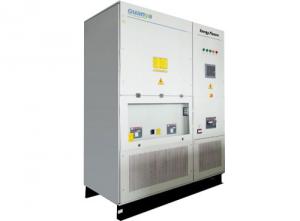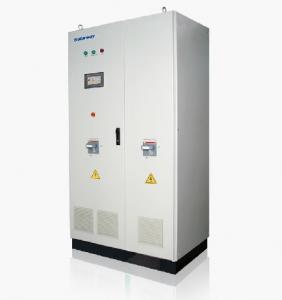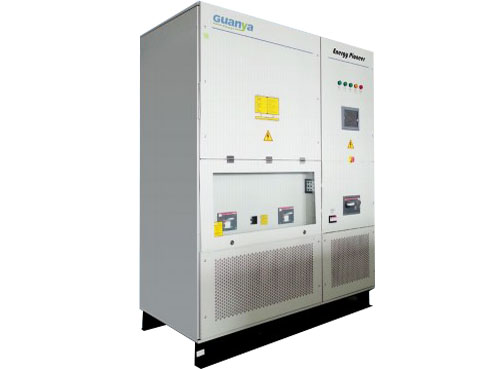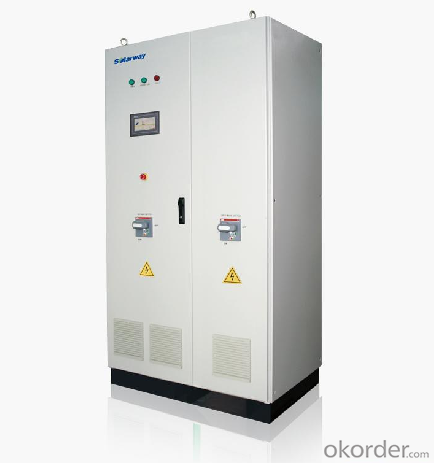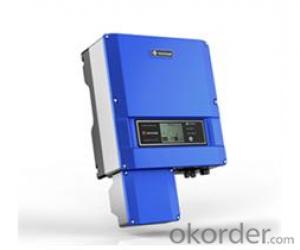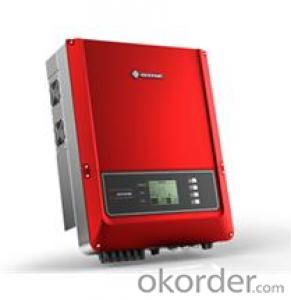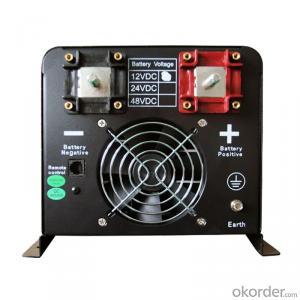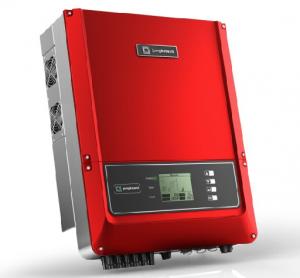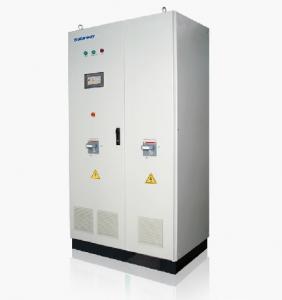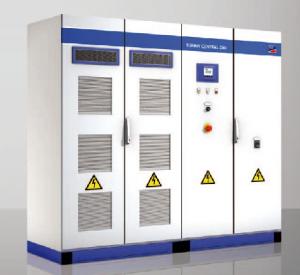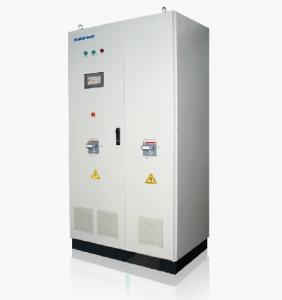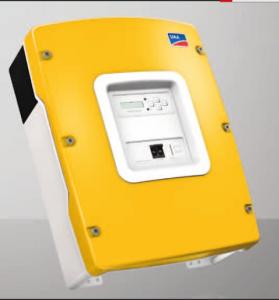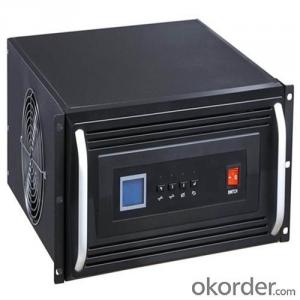LVRT PV On-grid Inverter GSG-500KL from CNBM China
OKorder Service Pledge
OKorder Financial Service
You Might Also Like
Description:
CNBMSOLAR is a world-leading and Vertical integrated manufacturer of high-performance with Silicon,
Wafer, Cells, Modules, which convert sunlight into electricity for residential, commercial, and utility-scale
power generation.
The capacity of CNBMSOLAR is reach to 1GW, and make sure each year our shipment capacity is more
Than 700-800MWs, at the same time, we have set up the largest solar power station with our partner
in Ukraine.
CNBM is a Quality + Service oriented company with“Excellence at Each Step” approach, composed of
the finest components from TUV and IEC-certified partners around the world, CNBM modules consistently
undergo a variety of trials at the company’s Test & Development Centre, ensuring peak performance
capabilities. The company is committed to develop and provide the world with clean and renewable energy
to ease the energy shortages as well as human kind’s impact on the environment
Technicalparameters
Electrical plant
Items | Parameters | |
DC input | Maximum DC input power (KWp) | 550kW |
Maximum PV open-circuit voltage(VDC) | 1000VDC | |
Maximum PV array input current(A) | 1250A | |
DC input voltage range (VDC) | 0~1000VDC | |
MPPT voltage range (VDC) | 500~850VDC | |
AC output | Rated output power (KW) | 500kW |
Operating voltage range (Vac) | 315Vac | |
Operating frequency(Hz) | 47.5~51.5Hz | |
Maximum efficiency(%) | 98.6% | |
Power factor | ≥0.99 | |
THD(%) | <3% | |
Self-consumption at night(W) | <80W | |
Noise emission | ≤65dB(1m) | |
Protection function | Protection rating | IP20(indoor) |
Over/Under voltage protection | Yes | |
Over/under frequency protection | Yes | |
Anti-islanding protection | Yes | |
Over current protection | Yes | |
Polar reversed wiring protection | Yes | |
Overload protection | Yes | |
Usage environment | Usage temperature range | -20℃~+55℃ |
Storage temperature range | -40℃~+65℃ | |
Usage relative humidity | 0~95%RH | |
Altitude | 3000m |
Mechanical plant
Items | parameters |
Dimension (W/H/D) | 950*2000*2140mm |
Weight | 1.423t |
Human-machine interface and communication
Items | Parameters |
Display | LCD-Touch |
Standard communication | RS485 |
Optional communication | GPRS, Ethernet |
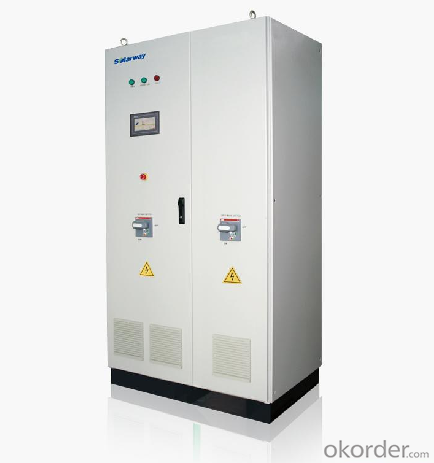
FAQ:Could you pls introduce more about CNBM?
CNBM Group is short for China National Building Materials Group Corporation, which is established in 1984 with approval from the State Council
CNBM Group is the largest comprehensive building materials industry group in China
The Group has a total asset of over RMB 360 billion, more than 180,000 employees and 17 subsidiaries
- Q: Can a solar inverter be integrated with smart home systems?
- Yes, a solar inverter can be integrated with smart home systems. Smart home systems allow for the monitoring and control of various devices and appliances, including solar inverters. By integrating a solar inverter with a smart home system, users can monitor the performance of their solar panels, track energy production, and even remotely control the inverter settings. This integration enables homeowners to optimize their energy usage, increase efficiency, and seamlessly manage their solar energy systems.
- Q: Can a solar inverter be monitored remotely?
- Yes, a solar inverter can be monitored remotely. With the advancement in technology, many solar inverters are equipped with monitoring systems that allow users to remotely monitor and control their solar power systems. This can be done through various methods such as mobile apps, web-based platforms, or even through specialized software. Remote monitoring enables users to track the performance, energy production, and overall health of their solar inverters from any location with internet access.
- Q: What is the role of a solar inverter in voltage and frequency regulation during grid disturbances?
- The role of a solar inverter in voltage and frequency regulation during grid disturbances is to ensure stable and reliable power supply from solar panels to the grid. It monitors the voltage and frequency of the grid and adjusts the output of the solar panels accordingly to maintain a consistent and synchronized power flow. This helps to prevent power fluctuations and protect the grid from disturbances, ensuring efficient and safe operation of the electrical system.
- Q: What are the different output waveforms of a solar inverter?
- The different output waveforms of a solar inverter can vary depending on the type and design of the inverter. The most common output waveform is a modified sine wave, which is a stepped approximation of a true sine wave. However, some solar inverters can produce a pure sine wave output, which is an exact replication of the smooth sinusoidal waveform found in utility power. Additionally, there are also solar inverters that can produce a square wave or a quasi-square wave output waveform. The choice of output waveform depends on the specific application and the compatibility requirements of the connected appliances or equipment.
- Q: Can a solar inverter be used off-grid?
- Yes, a solar inverter can be used off-grid. Off-grid systems typically include a solar panel array, a charge controller, batteries for energy storage, and an inverter to convert the stored DC (direct current) electricity from the batteries into AC (alternating current) electricity for use in off-grid applications. The inverter plays a crucial role in converting the DC power from the solar panels or batteries into usable AC power, making it possible to power various appliances and devices off-grid using solar energy.
- Q: Can a solar inverter be used with a solar-powered pool heating system?
- Yes, a solar inverter can be used with a solar-powered pool heating system. The solar inverter is responsible for converting the direct current (DC) electricity generated by the solar panels into alternating current (AC) electricity that can be used to power the pool heating system. By connecting the solar inverter to the solar panels and the pool heating system, the solar energy can be efficiently harnessed and utilized to heat the pool.
- Q: How does a hybrid solar inverter work?
- A hybrid solar inverter works by converting the direct current (DC) electricity generated by solar panels into alternating current (AC) electricity that can be used to power appliances and equipment in a home or business. It also has the ability to store excess electricity in batteries for later use. Additionally, it can draw electricity from the grid when solar power is not sufficient, ensuring a continuous power supply. Overall, a hybrid solar inverter maximizes the use of solar energy and provides flexibility in managing electricity consumption.
- Q: What is the power factor of a solar inverter?
- The power factor of a solar inverter refers to the ratio between the real power and the apparent power. It indicates how effectively the inverter converts the DC power generated by solar panels into AC power. A high power factor (close to 1) indicates efficient power conversion, while a low power factor (close to 0) signifies poor conversion efficiency.
- Q: What is the role of a solar inverter in a battery storage system?
- The role of a solar inverter in a battery storage system is to convert the direct current (DC) electricity produced by the solar panels into alternating current (AC) electricity, which is compatible with the electrical grid and can be used to power household appliances or feed back into the grid. Additionally, the solar inverter manages the charging and discharging of the batteries, ensuring efficient energy storage and usage.
- Q: Can a solar inverter work in low light conditions?
- Yes, a solar inverter can work in low light conditions. While the output power of a solar inverter may decrease in low light conditions, it is still capable of converting the available sunlight into usable electricity. The performance may vary depending on the specific model and technology used, but modern solar inverters are designed to work efficiently even in low light situations.
Send your message to us
LVRT PV On-grid Inverter GSG-500KL from CNBM China
OKorder Service Pledge
OKorder Financial Service
Similar products
Hot products
Hot Searches
Related keywords
